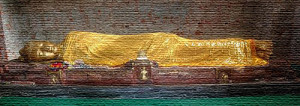Old age, sickness, death. Not what we really want to think about, right? But the Buddha urges us to think about them anyway.
First, because it lends an urgency to our practice. We just don’t know how much time we have left, so we’d better get on it.
Second, recognizing our own physical vulnerability and mortality leads to compassion and empathy for others: it’s harder to turn away from that crooked old man shuffling along on a walker if you understand that you, too, will be there soon.
And third, it is an opportunity to practice the third of the three jewels: sangha, or community. A sutta tells of a monk in the Buddha’s sangha who was suffering from dysentery. The other monks turned away from their suffering brother, according to the text, because he had “nothing to offer them.” But the Buddha himself came to the aid of the sick man, washed him, brought him food, and sat with him.
The Buddha said, “Monks, you have no mother, you have no father, who might tend to you. If you don’t tend to one another, who then will tend to you? Whoever would tend to me should tend to the sick.”
With this in mind, some of us have been talking about starting a circle of care within the Carson City sangha.
This circle of care could provide, for example, a phone number/phone tree we could call in an emergency that would alert all other members to our status (Emergency room? Surgery?) Or we could also offer organized volunteer support to one another (drive to chemotherapy, company while recuperating from surgery, grocery shopping, etc.)
If you are interested in exploring this circle of care idea, please contact Anne through the contact form on this website.



